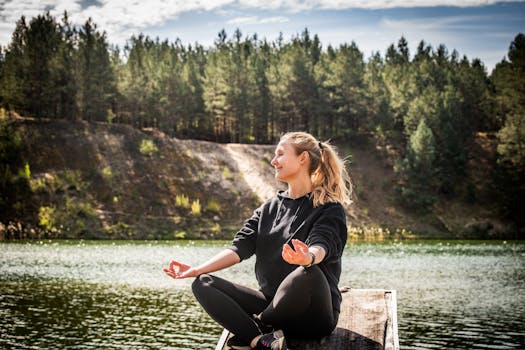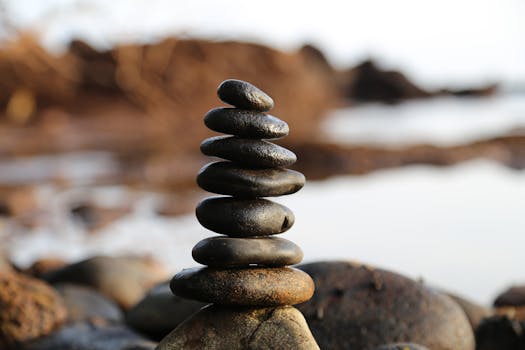
“
Mindfulness Practices for Stress Relief: Finding Peace in a Busy World
Mindfulness practices for stress relief are becoming increasingly popular as people seek to manage their stress and improve their overall well-being. Mindfulness is the practice of being present in the moment, without judgment or distraction. It involves paying attention to your thoughts, feelings, and sensations in a non-judgmental way, allowing you to respond to challenging situations more skillfully. For more insights on enhancing your well-being, check out our article on Breakthroughs in Renewable Energy Technology and Sustainability.
What is Mindfulness?

Mindfulness is a powerful tool for reducing stress and anxiety. It involves cultivating awareness of the present moment, without trying to change or judge it. By focusing on the present, you can break free from worries about the past or future and find a sense of calm and clarity. Mindfulness practices such as meditation, deep breathing, and yoga can help you develop this awareness and reduce your stress levels. If you’re interested in exploring more about personal growth, consider reading Unlocking the Secrets of Quantum Mechanics and its Implications for Reality.
Benefits of Mindfulness Practices

The benefits of mindfulness practices are numerous. Some of the most significant advantages include:
- Reduced stress and anxiety
- Improved sleep quality
- Increased focus and concentration
- Enhanced emotional regulation
- Boosted mood and overall sense of well-being
Mindfulness Practices for Stress Relief

There are many mindfulness practices that can help you reduce stress and improve your overall well-being. Some of the most effective include:
- Meditation: Meditation involves sitting quietly, focusing on your breath or a mantra, and allowing yourself to let go of distracting thoughts. Regular meditation practice can help reduce stress and anxiety, improve sleep quality, and boost mood.
- Deep Breathing: Deep breathing involves taking slow, deliberate breaths, focusing on the sensation of the breath in your body. This can help calm your nervous system, reduce stress and anxiety, and improve overall well-being.
- Yoga: Yoga is a physical practice that combines movement, breath, and meditation to promote relaxation and reduce stress. It can help improve flexibility, balance, and strength, while also reducing symptoms of anxiety and depression.
- Body Scan: A body scan involves lying down or sitting comfortably, focusing on each part of your body, and releasing any tension or discomfort. This can help you become more aware of your physical sensations, reduce stress and anxiety, and improve overall well-being.
Incorporating Mindfulness into Daily Life

Incorporating mindfulness into your daily life can be simple and enjoyable. Here are some tips to get you started:
- Start small: Begin with short periods of mindfulness practice, such as 5-10 minutes per day, and gradually increase as you become more comfortable with the practice.
- Be consistent: Try to practice mindfulness at the same time each day, so it becomes a habit.
- Find what works for you: Experiment with different mindfulness practices, such as meditation, deep breathing, or yoga, to find what works best for you.
- Make it a ritual: Incorporate mindfulness into your daily routine, such as right after waking up or before bed, to make it a special and enjoyable part of your day.
See more:
https://www.mindful.org/
https://www.headspace.com/
https://www.yogaalliance.org/



